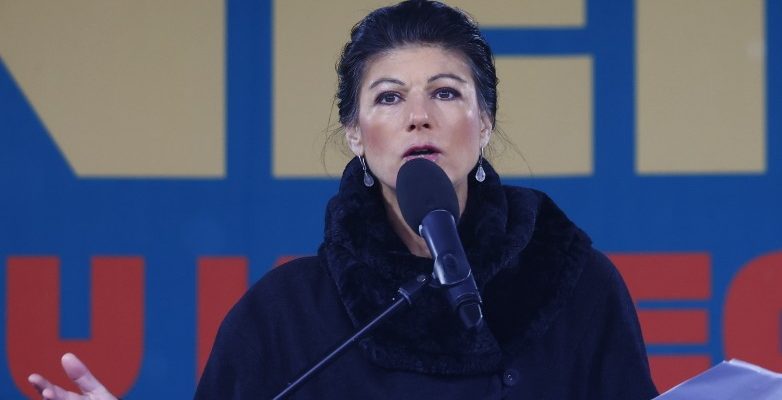There is no doubt who is the star on this Saturday afternoon in the Berlin drizzle. Sahra Wagenknecht, a former left-wing politician and currently involved in founding a party named after herself, is welcomed at the Brandenburg Gate with loud cheers. She is the keynote speaker at a demonstration registered here. Title: “No to wars – stop the arms madness – shape the future peacefully and justly”.
It is not the first so-called peace demonstration that Wagenknecht has taken part in this year – in the spring she wrote a “manifesto for peace” together with the women’s rights activist Alice Schwarzer and then spoke in front of around 13,000 spectators at the Brandenburg Gate. At that time there was a lot of support from the right, including the AfD declaring its support. All in all, it was an event that promoted the break between Wagenknecht and the left, to which she was still a member at the time.
One party resignation later, Wagenknecht is now back in Berlin-Mitte, this time the organizers have made it clear in the call for demonstrations that right-wing groups and explicitly the AfD are not welcome. The central demand of the rally is negotiations with Russia. But of course that doesn’t mean that everyone who came really shares the same beliefs.
But first, Wagenknecht knows what her audience wants to hear: It is “incredibly important in today’s world” to speak out for peace. Unlike what the traffic light coalition and especially Federal Defense Minister Boris Pistorius (SPD) would do – his formulation, according to which Germany must become “war-ready” again, will be the topic of almost all requests to speak over the course of the afternoon. “In all seriousness, he says war-worthy. He doesn’t say capable of defending himself, he says war-worthy,” complains Wagenknecht. Only the Greens are “even worse”: it’s hard to believe that the party arose from the peace movement, says Wagenknecht, when you hear “what this war-drunk bunch is saying.”
Several thousand people demonstrated in front of the Brandenburg Gate on Saturday.
(Photo: Christian Ditsch/Imago/epd)
Up to this point, there is audible agreement among the approximately 5,000 visitors at the Brandenburg Gate, according to the police: they should please conduct peace negotiations with Russia and stop supplying Ukraine with weapons. The question of how exactly this should work is not an issue here.
Things get more complicated when it comes to the situation in the Middle East. Wagenknecht condemns the Hamas attacks and says: “Nothing, no injustice in this world, justifies such crimes.” A part of the audience refuses to give her acoustic approval. On the other hand, a mood cracker: “I think we should be just as shocked about the bombings in the Gaza Strip.” Germany has a special responsibility for Jewish life, said Wagenknecht, “but this responsibility does not oblige us to whitewash the Netanyahu government’s ruthless warfare as self-defense.”
You see signs that say “Putin = Peace,” meaning: Putin is peace
Later, on the same stage, musician Pablo Miró will perform a piece he calls “Urgent Song for Palestine.” Miró introduces it with the following words: “I’m really not an anti-Semite. But although I condemn every killing of a civilian from the bottom of my heart, I see the atrocities committed by Israel and all its supporters as something even worse. It can’t be any worse.” The lyrics of the chorus are “Free Palestine!”. Miró receives friendly applause from the crowd.
You also get the impression that a wild ideological mix has come together here: There are people who have brought posters with peace doves or colorful “Pace” flags. But you also see signs that say “Putin = Peace,” meaning: Putin is peace. There are signs that talk about “genocide in Gaza” and others that demand the release of Julian Assange. You can see representatives of the “Peace Bell Society” – and later there are photos on the Internet that suggest that at least a few ultra-right groups were mixed in with the demonstrators.
In this wild melange it is almost lost that the deputy party leader of the Left, Ates Gürpinar, also made it onto the list of speakers. He criticizes the Federal Republic’s high planned defense spending. It is probably an attempt not to leave the wild spectrum of different peace activists to the new competition from the Wagenknecht party. However, there is no duel: When Gürpinar speaks to the crowd in the Berlin winter cold, Sahra Wagenknecht has already performed her performance for hours.

